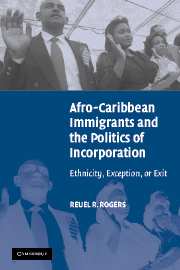Book contents
- Frontmatter
- Contents
- List of Tables
- List of Illustrations
- Acknowledgments
- Strangers at the Gate: Immigrant Political Incorporation in a New Century
- 1 Beyond Black and White: Theories of Political Incorporation
- 2 “Good” Blacks and “Bad” Blacks?
- 3 Letting Sleeping Giants Lie
- 4 Afro-Caribbeans and African Americans: Racially Bound or Ethnically Splintered?
- 5 Afro-Caribbean Sojourners: Home Country Ties and the Hope of Return
- 6 Black Like Who? Afro-Caribbean Immigrants, African Americans, and the Politics of Group Identity
- 7 Black Ethnic Options
- Conclusion: Reconsidering Political Incorporation and Race
- Appendix A Methodology
- Appendix B Interview Schedules
- Bibliography
- Index
6 - Black Like Who? Afro-Caribbean Immigrants, African Americans, and the Politics of Group Identity
Afro-Caribbean Immigrants, African Americans, and the Politics of Group Identity
Published online by Cambridge University Press: 07 November 2009
- Frontmatter
- Contents
- List of Tables
- List of Illustrations
- Acknowledgments
- Strangers at the Gate: Immigrant Political Incorporation in a New Century
- 1 Beyond Black and White: Theories of Political Incorporation
- 2 “Good” Blacks and “Bad” Blacks?
- 3 Letting Sleeping Giants Lie
- 4 Afro-Caribbeans and African Americans: Racially Bound or Ethnically Splintered?
- 5 Afro-Caribbean Sojourners: Home Country Ties and the Hope of Return
- 6 Black Like Who? Afro-Caribbean Immigrants, African Americans, and the Politics of Group Identity
- 7 Black Ethnic Options
- Conclusion: Reconsidering Political Incorporation and Race
- Appendix A Methodology
- Appendix B Interview Schedules
- Bibliography
- Index
Summary
Group identity has been a key concept for understanding how racial minorities and newcomers to the United States have achieved political incorporation. The classic literature on early European immigrants, for example, emphasized group identity as a resource for political engagement (Wolfinger 1965; Dahl 1961). Researchers believed feelings of group identity motivated European newcomers to naturalize, register, and go to the polls to support their coethnics running for political office. Identity thus was seen as a powerful fuel for immigrant political incorporation. The concept holds an even more important place in accounts of African Americans' bid for inclusion in the American polity. Studies of the civil rights movement, for example, suggest group identity served as a key rallying device for African Americans in their efforts to overcome discriminatory barriers. It helped galvanize thousands to engage in collective action to demand equal rights to participate fully in all arenas of American society (Chong 1991; Morris 1984; McAdam 1982).
It is no surprise, then, that scholars of contemporary immigration are also turning their attention to the concept of group identity (e.g., Lien, Conway, and Wong 2004; Lien 2001; Marschall 2001; Jones-Correa and Leal 1996). Insofar as previous studies give political weight to group identity among African Americans and early European immigrants, there is reason to wonder whether it will have similar significance for today's mostly non-white newcomers. The question is whether racial or ethnic group identity becomes politically salient for recent immigrants as they adjust to life in the United States.
- Type
- Chapter
- Information
- Afro-Caribbean Immigrants and the Politics of IncorporationEthnicity, Exception, or Exit, pp. 170 - 202Publisher: Cambridge University PressPrint publication year: 2006
- 1
- Cited by



